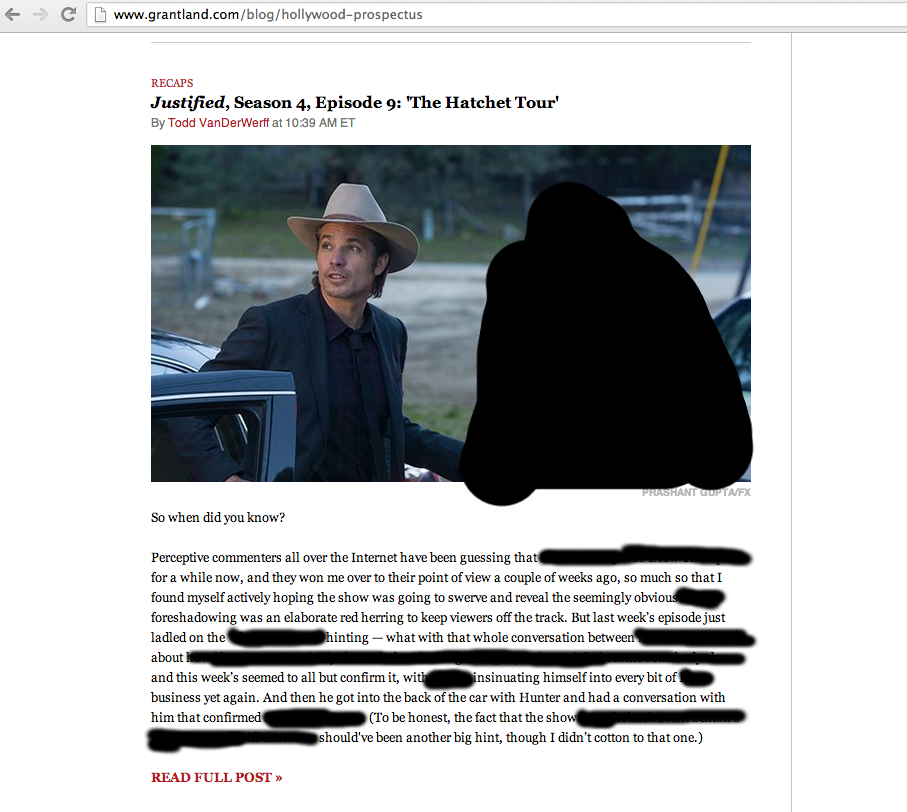(Note: I generally don’t like the idea of doing individual episode recaps, and this isn’t supposed to be that, although it may drift into recap territory at times, so be forewarned. Also, spoilers.)
It seems strange to consider that an episode of The Walking Dead could be described as beautiful, but last night’s episode, “Clear”, was that. Unlike most of this season (which has moved through storylines and characters at a breakneck pace), last night’s episode focused solely on one storyline, in one small town, with just four characters (five, if you count the unnamed hiker who bookends the episode): Rick, Carl, Michonne, and Morgan (who, if you don’t recall, was the man who saved Rick’s life in the pilot, along with his young son, Duane. Morgan was the one who Rick gave the radio to, and promised to try and stay in contact.).
With just four characters, and incredibly basic wants from a narrative perspective (Rick and the gang are looking for weapons, and then come upon Morgan; later, Carl decides that he wants to get something for his sister from another part of town), the episode is able to break into two two-person relationships: Rick and Morgan, and Carl and Michonne.
With the history that Rick and Morgan share, it makes sense that Rick would want to save his first friend in the apocalypse. What follows over the course of the hour is a long, emotional exploration of two men who have managed to survive thus far, but at great personal cost, and the difference between the one who still has some sense of hope (although as Rick and company demonstrate with the unnamed hiker, not as much empathy for strangers as before) and the one who has lost all hope, to the point where he won’t even kill himself, because he feels that he still deserves punishment for his failures.
In the other story, Carl and Michonne go on what seems like a simple errand – Carl wants to retrieve a photo of his family from a small diner nearby, because he wants his sister to have a photo of her mother – although this task, also, reminds us that Carl is still a child who misses his mother, despite his best efforts to remain emotionally distant for much of the season. It also finally gives us a little bit of humanity from Michonne, who up to this point has generally tried to make herself the most unlikeable person in the history of the apocalypse.
Given the simplicity of the narrative in the episode, and the need for long, emotional, focused two person scenes, it makes perfect sense that Scott Gimple (who has written some of the best episodes over the course of the three seasons, and has been named the new showrunner for season 4) was tapped to write the episode, and he’s able to construct a compelling, entertaining, and yes, beautiful episode out of essentially two relationships.
On a larger level, the episode succeeds because it is a reminder of what the show can represent – it’s an episode with little zombie threat; indeed, most of the zombie attacks are off-screen – the first is cut away from once Rick fires the first bullet, and the second primarily happens with Michonne inside a diner, again, off-screen – we don’t need to see the actual gore and action to know that our protagonists are capable of handling these threats, and instead gives more room for character moments to occur. At its best, The Walking Dead has always been a show about people and their relationships – not the preachy moral questions of Dale or the evil vs. less evil shootout that we’re leading up to in the final episodes of season 3, but this. Two men, in a room. One still has hope, at least for now. The other has lost his, possibly never to return. It’s a reminder that amidst all the horror, the blood, the gore, the endless headshots, deep down, these are still people, and that their problems, their moral qualms, heightened though they may be, aren’t nearly as different from our own as we might expect.
